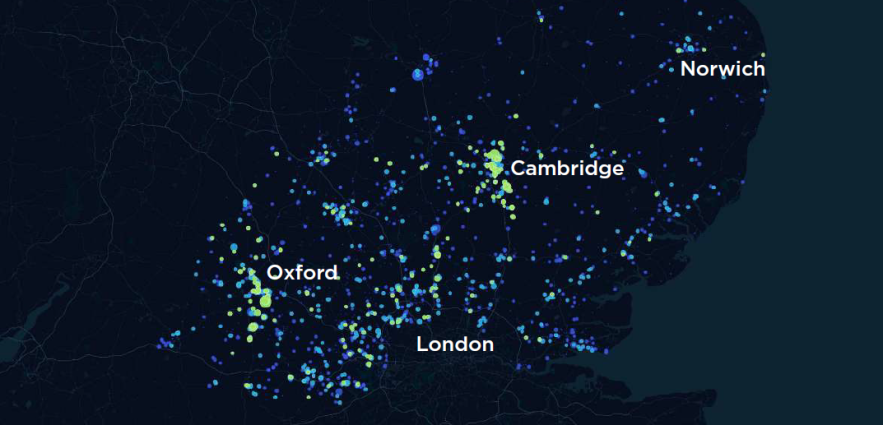
Submitted by Simone Castello on Mon, 17/05/2021 - 10:21
A new report titled 'Life Sciences Innovation: Building the Fourth Industrial Revolution', which presents international experts from across the life sciences industry to join the dots between investors, academics and the real estate sector, features a case study completed as part of a CSIC industry secondment with global design practice Perkins & Will.
Titled 'High Growth Communities' (p.51 in the report), the case study is authored by Andrea Imaz, Senior Urban Designer at Perkins & Will and CSIC Researcher Mingda Yuan. Part of a secondment with both CSIC and The Alan Turing Institute, the study analyses hotspots of sci-tech and life sciences companies across the Oxford-Cambridge arc, the Cambridge Norwich Tech Corridor and London's northern periphery.
We approached this secondment as an opportunity to improve our data analysis knowledge and provide better informed-design processes to the communities and employment locations we work with. During the process we have been able to assess our analytical methodologies and identify valuable metrics to be implemented as performance indicators for sustainable and resilient urban design projects or planning policies. Andrea Imaz, Perkins & Will
The research behind 'High Growth Communities' highlights the increasing opportunities to attract and retain high-growth companies in city centres and suburban research parks, through the provision of high-quality services, enjoyable amenities and efficient commuting options.
Commenting on the secondment with CSIC, Andrea Imaz of Perkins & Will said: “We approached this secondment as an opportunity to improve our data analysis knowledge and provide better informed-design processes to the communities and employment locations we work with. During the process we have been able to assess our analytical methodologies and identify valuable metrics to be implemented as performance indicators for sustainable and resilient urban design projects or planning policies. Different advanced statistical techniques and recent machine learning processes have been incorporated into our repository to create value and share knowledge across the company. Moving into a zero-carbon policies scenario, this secondment experience is helping us to advise our clients on how to track and improve their performance to become sustainable communities.”
‘The Life Sciences Innovation: Building the Fourth Industrial Revolution’ report, which is by Perkins & Will, Blackstock and Savills, aims to connect the real estate, science and investment communities that coexist in the life sciences ecosystem by sharing best practices and insights from international innovators. The pandemic has brought into sharp relief how innovation can help address societal challenges and the urgent need for smart space transformation underpinned by digital technologies to unlock more efficient and sustainable methods.
- ‘Life Sciences Innovation: Building the Fourth Industrial Revolution’ was featured in a Guardian article.
